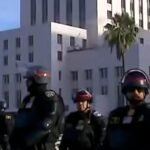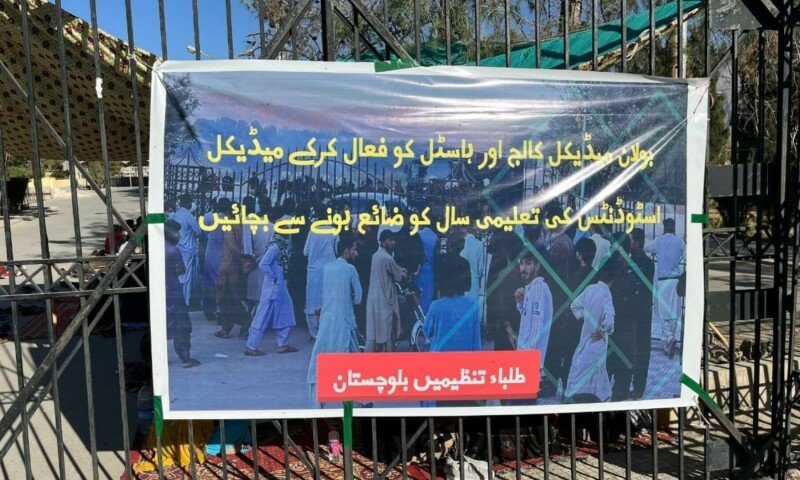In Baluchistan, where the challenges in the provision of medical care and access to education are in abundance, the prolonged suspension of the operation of the BMC has caused a debate.
Since November of last year, the life of approximately 2,000 students in Quetta has been trapped in Limbo. The largest medical institution in Balochistan, Bolan Medical College (BMC), has been closed for almost six months, without clarity about when it will open again.
Initially, the closure was attributed to a student dispute that became violence, but later, the explanation expanded to include infrastructure repairs for a long time. In a notification issued last month, a copy of which is available with Dawn.comThe university director declared that academic activities would resume on April 25.
However, the day came and left without progress: the BMC remains closed. “We are currently completing the physical verification of shelter assignments … once it is complete, classes will resume,” said the university administration. A second notification issued on May 11 said that the University would now open on Friday, May 16.
For the hundreds of students enrolled in the university, many of remote areas, the closure has caused confusion and frustration. They were asked to vacate hostels and return home with limited information about what comes next.
“All academic schedule has been delayed, affecting our studies, exams and future plans,” said Mujereb Mengal, a third -year student of MBBS in BMC.
In Baluchistan, where access to medical care and education is already a challenge, the prolonged suspension of BMC operations has caused a debate. In the center of this discussion there are questions about the true cause of closure, whether a necessary step for institutional improvement, or if more broad administrative and political factors were at stake.
The closure
On November 12, a dispute between two groups of students became violence, leaving at least seven injured students and causing a large deployment of security personnel. A total of 12 students were arrested.
“The police raided our shelters and evacuated us by force at 2 am, treating us as if we were terrorists,” said Shabbir Zehri, a first -year student of MBBS. “We were stranded in the streets for the rest of the night,” he recalled, adding that valuable articles, including mobile phones, laptops and books, were stolen from their rooms during eviction.
“Without another option, we had to look for accommodation in private shelters, but the rates were exorbitant. Some of us were forced to sell phones, belongings and even goats just to pay the rent. The alternative was to use that money to travel back home,” he shared.
According to the police, the conflict arose from a disagreement about the allocation of the shelter. The same day, the University issued a notification that indicates that shelters would be closed for two weeks for “renewal work and due to the situation of the law and order.” A second notification extended the closure indefinitely. Academic activities were also suspended.
Talking with Dawn.comThe BMC administrative officer, Hamdullah Khan, recalled that the incident videos quickly circulated on social networks. The upper administrators who tried to intervene were also attacked by students, he said.
“The police finally won the situation control. However, concerns about other clashes led to closing during the last 10 days of November,” he added.
A few days later, said Hamdullah, the provincial Minister of Health visited the campus and ordered renovations that had been pending for more than a decade.
Meanwhile, the students alleged that the BMC administration tried deliberately to frame the problem through an ethnic lens. “The fights are presented in each institution,” said Kabeer Baloch, zonal president of the Baloch Student Organization (BSO).
He explained that while the incident involved some students, it was resolved after the intervention of BSO and Pashtun student leaders. “BSO does not encourage ethnic hatred or violence. If any of our members had been involved, they would have already been suspended,” he said.
The Pashtun Student Organization (PSO) had a similar opinion. “The statements that the BMC was closed due to the violent behavior of PSO students has no basis. Our students have often been victims of violence, which we have repeatedly brought to the administration’s notice,” said Mujtaba Hassan, secretary of PSO information.
The students also pointed out that the groups involved later held a press conference confirming that they had solved their problems. “But the government remained firm about maintaining the university closed,” said Khursheed Baloch, a member of the Baloch Student Action Committee (BSAC), another student political organization.
Renewal work: reality or excuse?
Recently, the videos that show glimpses of the University of Renewed Medicine have circulated online. However, students are still skeptical about the scope and impact of repairs.
Khursheed said that the renewal work was largely superficial. “Everything we have heard for months are excuses. If any work has been done, it is minimal or only exists on paper,” he said.
“On the field, the campus remains in a deteriorated condition. The academic loss we have suffered is immeasurable, and it is unfair to hide it behind the narration of renewal,” he added.
Although Kabeer Baloch del BSO acknowledged that some renewal had taken place, he questioned the approach, citing the example of the King Edward University of Medicine, where construction continued without interrupting classes. “The government could also have opted for alternative solutions here, but chose not to do it.”
Mujtaba Hassan of the PSO agreed. “You cannot play with students’ futures for the sake of infrastructure. In other provinces, students complete their MBBs in five years. Here, the closures take it to six or seven years,” said the group’s spokesman.
For its part, the BMC administration says that the sports complex, the shelters, conferences, laboratories and other facilities had been updated, with new comforts such as renewed rooms, doors and replaced windows, supply of electricity and improved water, and installation of carpets and curtains.
However, despite these statements, students are not convinced, arguing that the academic cost of closing greatly exceeds infrastructure improvements.
“The fights occur in each university, and that is normal, but closing the institute for six months is not an option … there are ways to face them,” said Mohammad Azeem, a third -year medical student. “We are all affected by the closure of the university, and there is a wave of uncertainty about what will happen later.”
Fear of hyperecurization on campus
Together with uncertainty, there is a growing restlessness among students, not only in BMC, but in Baluchistan, for fear of hyper-segury of university campuses.
For its part, the BMC administration refuted claims with respect to the presence of military personnel, clarifying that private security guards had been hired to guarantee security and avoid unauthorized access.
However, the student groups alleged that educational institutions were increasingly titled to suppress dissent and student activism in politically aware academic spaces.
The BSAC criticized the “toxic environment” created under the pretext of security, arguing that educational institutions should be centers of intellectual learning and freedom, not places of fear and surveillance.
“Students must grow in the shadow of books, not under the shadow of weapons,” Khursheed argued.
Other student organizations echoed this opinion. “Insecurity is widespread throughout Baluchistan, but why do safety concerns only close educational institutions?” The Kabeer of the BSO asked. “Students deserve to study in a peaceful environment.”
Dawn.com I contacted the Baluchistan government to comment, but did not receive an answer until the presentation of this report.
The resistance
As the days became weeks, the students became increasingly apprehensive and even organized a sitting out of the BMC. They demanded that the shelter repairs be carried out without interrupting education, scholarships are disbursed and well -being funds are assigned transparently.
Dawn.com He contacted the BMC administration, as well as the Baluchistan government with respect to the budget assigned for renovations, but did not receive an answer.
The seated, which lasted several days, finally led to negotiations between students and the administration. A written guarantee was issued, promising that the students’ demands would be met within a specific period.
However, underlying problems are still unresolved.
According to Dr. Maqbool Langove, associated professor at BMC, the closure has severely impacted the academic year. The five -year MBBs program often extends to six years in the university, but additional closures will only prolong it more.
The exams of the exams have been thrown into uncertainty, and the load of the course could now be reduced, he said. “For the Faculty, it is a problem: the curriculum will have to become more selective.”
He added that although teachers had recommended to change classes online, the availability of the Internet, especially in peripheral areas, was an important obstacle, aggravated by frequent stops on the Internet.
BMC student policy and administration
The BMC has long been a center of Baloch’s nationalist policy. Its rooms resonate with the legacy of past leaders who once headed the Baloch national movement. Over the years, tensions between administration and students have often accumulated.
Currently, the debate revolves around the statement that student policy has changed study circles to the group -centered policy, focused on shelter assignments and campus conflicts.
“If the administration fulfills its duties correctly, PSO will never interfere,” Mujtaba said. “But if students are deprived of facilities and education due to negligence, we will raise our voices.”
Meanwhile, other students described the statements of the administration “negative propaganda”.
“They spend the fact that students simply want to complete their education and succeed,” said Kabeer Baloch de Bso. “We have always tried to strengthen institutional frameworks and promote a positive relationship between teachers and students.”
The students also criticized the narrative of the provincial government to send young people abroad to scholarships to prestigious universities such as Harvard and Oxford, qualifying it as a “hollow slogan” that ignores the collapse of the Baluchistan education system itself.
“If there really was an educational revolution, the most important medical institution of Baluchistan would not have remained closed for six months,” Khursheed of Bsac said.
“These statements feel empty unless they are backed by tangible change. The real educational revolution is about access to basic academic facilities, something for which students are still fighting here.”
Image of heading: A banner hung at the main entrance of Bolan Medical College in Quetta. – All the author’s photos








